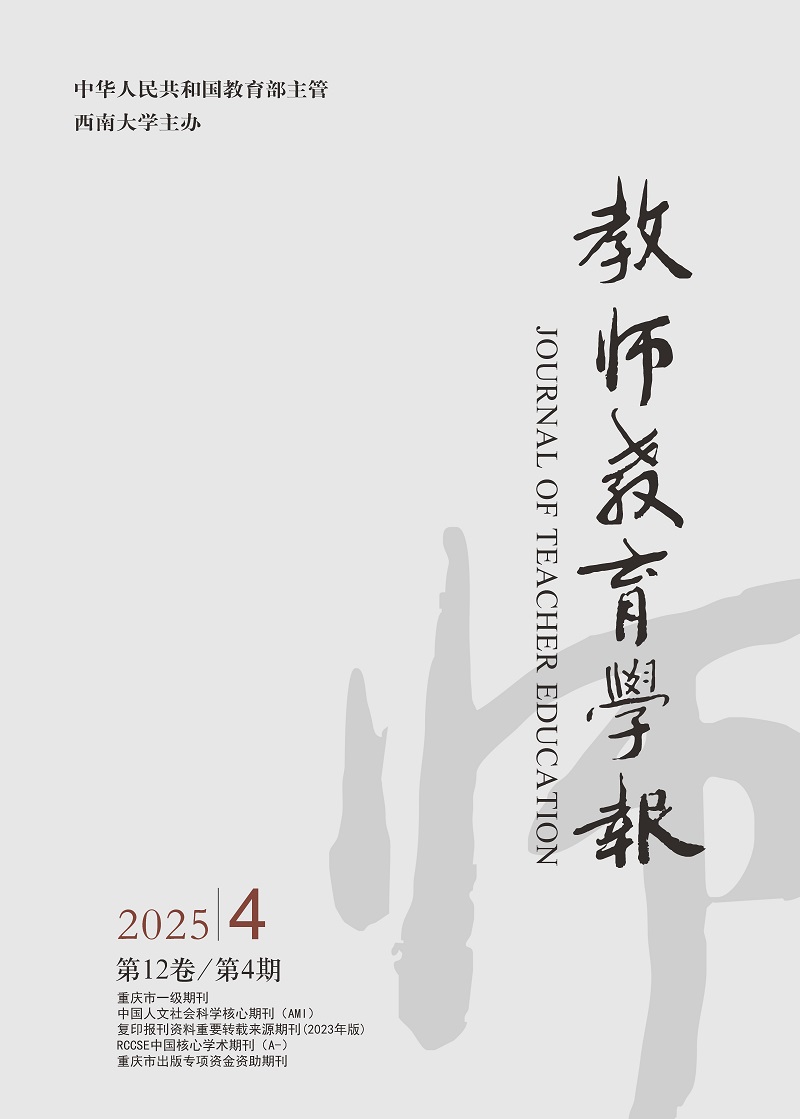|
[1]
|
王天平, 李珍.智能时代教师技术焦虑的形态、动因与对策[J].电化教育研究, 2022(10):110-115, 128.
Google Scholar
|
|
[2]
|
教育部(2022). 全面推进高质量教师队伍建设[EB/OL]. (2022-04-25) [2023-09-10]. htt p://www.moe.gov.cn/jyb_xwfb/s5148/202204/t20220425_621410.html.
Google Scholar
|
|
[3]
|
于肖楠, 张建新.韧性(resilience):在压力下复原和成长的心理机制[J].心理科学进展, 2005(5):658-665.
Google Scholar
|
|
[4]
|
HOLLING C S. Resilience and stability of ecological systems[J]. Annual Review of Ecol ogy and Systematics, 1973, 4:1-23.
Google Scholar
|
|
[5]
|
祝智庭,沈书生.数字韧性教育:赋能学生在日益复杂世界中幸福成长[J].现代远程教育研究, 2020(4):3-10.
Google Scholar
|
|
[6]
|
KOHN V.How employees' digital resilience makes organizations more secure[C]//24th Paci fic Asia Conference on Information Systems,PACIS 2020.June 22-24,2020.Dubai, UAE:A IS Electronic Library(AISeL), 2020:190.
Google Scholar
|
|
[7]
|
ERI R, GUDIMETLA P, STAR S, et al. Digital resilience in higher education in respon se to COVID-19 pandemic:student perceptions from Asia and Australia[J]. Journal of Un iversity Teaching and Learning Practice, 2021, 18(5):108-134.
Google Scholar
|
|
[8]
|
TRAN T, HOM T, PUAN T H, et al. How digital natives learn and thrive in the digit al age:evidence from an emerging economy[J]. Sustainability, 2020, 12(9):3819.
Google Scholar
|
|
[9]
|
RABBANEE F K, QUADDUS M, GURURAJAN R, et al.Conceptualizing digital resilie nce of Australian tertiary-level students[C]//WA Teaching and Learning Forum 2019,Freem antle, WA:The University of Notre Dame,2019
Google Scholar
|
|
[10]
|
SHARMA M K M K, ANAND N, ROOPESH B N, et al. Digital resilience mediates h ealthy use of technology[J]. Medico-Legal Journal, 2022, 90(4):195-199.
Google Scholar
|
|
[11]
|
AL-ABDULGHAN Y. Exploring digital resilience in Qatar:a socio-technical perspective [D].Pennsylvania:Carnegie Mellon University, 2021.
Google Scholar
|
|
[12]
|
薛晓琪, 赵晓伟, 沈书生.突破危机:学习主体的数字韧性及其构建[J].电化教育研究, 2022(2):49-55.
Google Scholar
|
|
[13]
|
沈书生.面向幸福成长:设计支持数字韧性构建的学习空间[J].现代远程教育研究, 2021(3):18-24.
Google Scholar
|
|
[14]
|
王佑镁, 南希烜, 李宁宇等.编程韧性:数字时代计算思维培养的新议题[J].现代教育技术, 2023(2):14-23.
Google Scholar
|
|
[15]
|
GARISTA P, POCETTA G.Digital Resilience:meanings, epistemologies and methodologies for lifelong learning[DB/OL].[2023-09-10].https://www.academia.edu/9587780/Digital_Resilience_meanings_epistemologies_and_methodologies_for_lifelong_learning.
Google Scholar
|
|
[16]
|
赵磊磊, 陈祥梅, 马志强.人工智能时代教师技术焦虑:成因分析与消解路向[J].首都师范大学学报(社会科学版), 2022(6):138-149.
Google Scholar
|
|
[17]
|
MCDONNELL R P, FRASER S, SULLVAN F.Digital resilience in the American workfor ce:findings from a national landscape scan on adult digital literacy instruction[R].Washin gton:Jobs for the Future, 2022.
Google Scholar
|
|
[18]
|
LEE A Y, HANCOCK J T. Developing digital resilience:an educational intervention impr oves elementary students' response to digital challenges[J]. Computers and Education Ope n, 2023, 5:100144.
Google Scholar
|
|
[19]
|
EMANUEL N. "Reinforcing that it's a good thing, but there's dangers":exploring young people's advice on digital resilience[D]. Norwich:University of East Anglia, 2021.
Google Scholar
|
|
[20]
|
REYNOLDS L, PARKER L.Digital resilience:Stronger citizens online[DB/OL].(2018-05) [2023-09-10].https://www.isdglobal.org/wp-content/uploads/2018/05/Digital_Resilience_Project_Report.pdf.
Google Scholar
|
|
[21]
|
UK Council for Internet Safety(UKCIS).Digital resilience framework a framework and t ool for organisations, communities and groups to help people build resilience in their d igital life[EB/OL].(2019) [2023-09-10].https://assets.publishing.service.gov.uk/media/5d7a00a0e5274a20381543e6/UKCIS_Digital_Resilience_Framework.pdf.
Google Scholar
|
|
[22]
|
SUN H Y, YUAN C, QIAN Q, et al.Digital resilience among individuals in school ed ucation settings:a concept analysis based on a scoping review[J].Frontiers in psychiatry, 2022, 13:858515.
Google Scholar
|
|
[23]
|
陈建伟, 席梦如, 傅骞.大学生数字韧性测评框架及影响因素研究[J].中国电化教育, 2023(6):68-74.
Google Scholar
|
|
[24]
|
薛晓琪, 赵晓伟, 沈书生, 等.在线学习中的数字韧性:关键维度、现状描摹与提升策略:基于江苏省初中生调研数据的分析[J].电化教育研究, 2023(4):72-78, 85.
Google Scholar
|
|
[25]
|
GRANT C, RUSSELL E.Agile working and well-being in the digital age[M]. Switzerland:Springer International Publishing, 2020.
Google Scholar
|
|
[26]
|
KAUR M, SINGH B. Teachers' attitude and beliefs towards use of ICT in teaching and l earning:perspectives from India[C]//Proceedings of the Sixth International Conference on Technological Ecosystems for Enhancing Multiculturality. October 24- 26, 2018, Salaman ca, Spain. New York:ACM, 2018:592-596.
Google Scholar
|
|
[27]
|
LUIK P, TAIMALU M. Predicting the intention to use technology in education among st udent teachers:a path analysis[J]. Education Sciences, 2021, 11(9):564.
Google Scholar
|
|
[28]
|
CAMILLERI M A, CAMILLERI A C. Digital learning resources and ubiquitous technolo gies in education[J]. Technology, Knowledge and Learning, 2017, 22(1):65-82.
Google Scholar
|
|
[29]
|
VISSENBERG J, LIVINGSTONE S, D'Haenens L.Digital Literacy and Online Resilien ce as Facilitators of Young People's Well-Being?[J].European Psychologist, 2022, 27(2):76-85.
Google Scholar
|
|
[30]
|
教育部关于发布《 教师数字素养》 教育行业标准的通知[EB/OL].2022:[2024-01-02].http://www.moe.gov.cn/srcsite/A16/s3342/202302/t20230214_1044634.html.
Google Scholar
|
|
[31]
|
The Seven Ingredients of Resilience:Information for Parents[J].Communique, 2010(6):33-34.
Google Scholar
|
|
[32]
|
MANNING C.A framework for digital resilience:supporting children through an enabling environment[DB/OL].(2021-01-20) [2023-09-10].https://blogs.lse.ac.uk/parenting4digitalfuture/2021/01/20/digital-resilience/.
Google Scholar
|
|
[33]
|
卡罗尔·德韦克.终身成长:重新定义成功的思维模式[M].南昌:江西人民出版社, 2017.
Google Scholar
|
|
[34]
|
钟志贤, 林安琪, 王觅.自我管理:远程自主学习的基本能力[J].远程教育杂志, 2008(4):29-36.
Google Scholar
|
|
[35]
|
ROBIN B.The educational uses of digital storytelling[C]//Society for Information Technolo gy & Teacher Education International Conference.Mar 19,2006,Orlando, Florida, USA:As sociation for the Advancement of Computing in Education (AACE), 2006:709-716.
Google Scholar
|
|
[36]
|
李德显, 李文灿.场景化学习背景下中小学教师的角色转变及应对策略[J].教育理论与实践, 2023(5):29-34.
Google Scholar
|
|
[37]
|
龙宝新, 邱灿.数字化时代的教师专业自主发展[J].中国教育学刊, 2023(8):79-85.
Google Scholar
|
|
[38]
|
梁伊铃, 罗军涛, 钟志贤.自助式学习:内涵、特征与进路[J].南京开放大学学报, 2023(1):42-48.
Google Scholar
|
|
[39]
|
约翰·库奇.学习的升级[M].徐烨华, 译.杭州:浙江人民出版社, 2019.
Google Scholar
|
|
[40]
|
王洁, 张民选.TALIS教师专业发展评价框架的实践与思考——基于TALIS2013上海调查结果分析[J].全球教育展望, 2016(6):86-98.
Google Scholar
|
|
[41]
|
曼努埃尔·迪亚斯. 数字化生活:假如未来已经先你而行[M]. 北京:中国人民大学出版社, 2020:140.
Google Scholar
|






 DownLoad:
DownLoad: